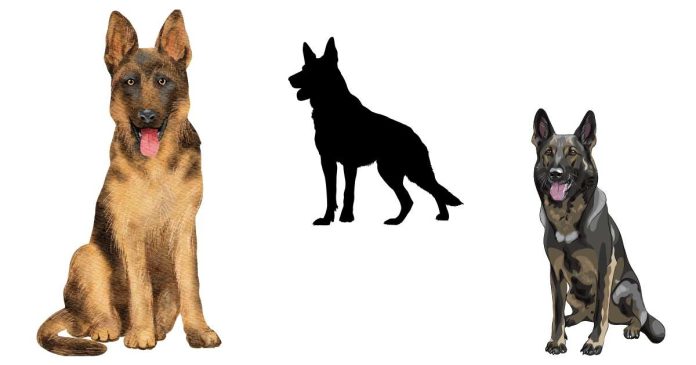When you breed a German Shepherd with another dog breed, the resulting puppies are known as a “designer dog” or a mixed breed. The characteristics of the puppies can vary widely, depending on the breed the German Shepherd is mixed with. Here are some general outcomes you might see when crossing a German Shepherd with another dog:
1. Appearance
- Coat: German Shepherds have a double coat that is dense and often thick. The mixed puppies could inherit a similar coat, or they might have a shorter or different coat depending on the other breed. For example, a mix with a Poodle might result in a curly or wavy coat.
- Size and Build: German Shepherds are large, muscular dogs, so mixed puppies may be on the larger side, though they could be smaller depending on the other breed’s size (e.g., a mix with a smaller breed like a Beagle could result in a smaller dog).
- Facial Features: The puppies might inherit the German Shepherd’s pointed ears, bushy tail, and strong facial structure, or they might look more like the other breed.
2. Temperament
- Intelligence: German Shepherds are highly intelligent and eager to please, which tends to be passed on to their mixed puppies. However, the temperament could also be influenced by the other breed. For example, a German Shepherd crossed with a Border Collie might result in an extremely intelligent and active dog.
- Trainability: German Shepherds are generally easy to train, so a mixed breed may be similarly trainable. However, if the other breed is more independent or stubborn (like a Husky), the dog might require more patience and consistency in training.
- Personality: German Shepherds are known for their loyalty, protectiveness, and sometimes aloofness toward strangers. Mixed puppies may inherit these traits or take on the more sociable or laid-back characteristics of the other breed.
3. Health
- Health Concerns: German Shepherds are prone to certain health issues, such as hip dysplasia, elbow dysplasia, and certain heart conditions. Depending on the other breed, the puppies might inherit these risks or have a different set of health concerns. For example, a German Shepherd mixed with a Poodle may reduce the likelihood of shedding and might have fewer skin problems, but still could inherit other issues from the Shepherd side.
- Hybrid Vigor: Some mixed breed dogs benefit from hybrid vigor, which means that the puppies could be less prone to genetic disorders that are common in one of the parent breeds. However, this is not guaranteed.
4. Energy Level
- Exercise Needs: German Shepherds are high-energy dogs, and their mixes will likely require a similar level of physical and mental exercise. A mix with a more laid-back breed (like a Basset Hound) may result in a dog that is less active, but generally, you can expect most German Shepherd mixes to be energetic.
5. Common German Shepherd Mixes
- German Shepherd + Golden Retriever: The “Golden Shepherd” is typically friendly, loyal, and intelligent. It combines the affectionate nature of a Golden Retriever with the alertness of a German Shepherd.
- German Shepherd + Husky: The “Gerberian Shepsky” tends to have striking looks, often inheriting the blue eyes and thick coat of a Husky, combined with the intelligence and protectiveness of a German Shepherd.
- German Shepherd + Poodle: The “Shepoodle” can be a hypoallergenic dog with a curly coat, known for its intelligence and trainability.
- German Shepherd + Rottweiler: The “Shottweiler” is a strong, protective dog, often displaying the muscular build and assertive nature of both breeds.
- German Shepherd + Doberman: This mix is typically confident, intelligent, and protective, making for an excellent guard dog.
Conclusion
Breeding a German Shepherd with another breed results in a mixed dog that may inherit a range of physical, temperamental, and behavioral traits from both parent breeds. The outcome can be unpredictable, but in general, you’ll get a loyal, intelligent, and active dog. If you’re considering adopting a mixed breed, it’s important to research both breeds to understand the potential traits and challenges you might encounter.


